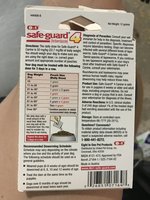- Apr 1, 2010
- 4
- 0
- 7
I hope someone can help. We have three hens. One RIR had been making odd grunt/cough/bark sound occasionally for about a week and a half. After reading, I thought she might have gapeworm. All three hens eat a lot of earthworms and grubs from the backyard, where they range free during the day. Went to worm her and others with Panacur paste last night, but before I could even get her beak open, she suddenly stretched out her neck and sounded like she was going to vomit. She thrashed away from me, neck out, making a terrible retching/gasping noise, then flapped and spun.She died before I even could put her out of her misery. Awful to watch.
I put a BB-sized blob of wormer on the beaks of the other two birds, and I think they ate most of it. Husband put on gloves and took out poor Jane and bagged her body up to throw away. We didn't want to bury in case a critter would dig her up. Now one of the other hens has her beak open, as if panting. No grunting, no stretched neck, but very occasional stumble. I could be imagining it. Did Jane have gapeworm? Are the others going to die? Any ideas?
I raked pinestraw out of pen and hit everything with DE. Am tossing the eggs the two remaining birds lay.
thank you for any help.
I put a BB-sized blob of wormer on the beaks of the other two birds, and I think they ate most of it. Husband put on gloves and took out poor Jane and bagged her body up to throw away. We didn't want to bury in case a critter would dig her up. Now one of the other hens has her beak open, as if panting. No grunting, no stretched neck, but very occasional stumble. I could be imagining it. Did Jane have gapeworm? Are the others going to die? Any ideas?
I raked pinestraw out of pen and hit everything with DE. Am tossing the eggs the two remaining birds lay.
thank you for any help.


